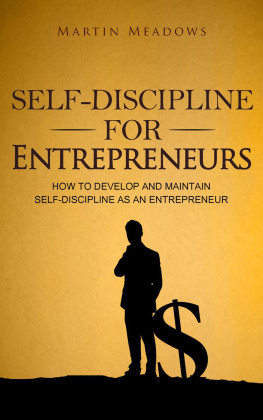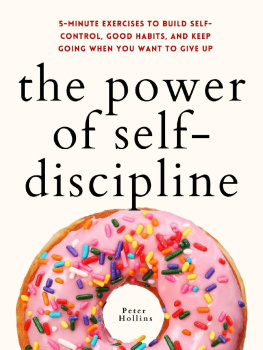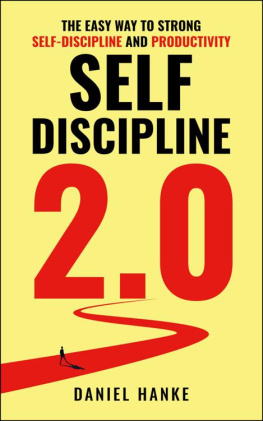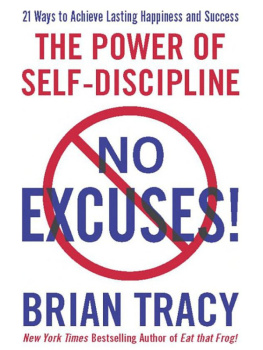Self Discipline:
How to Build Incredible Self Discipline and Maximize your Chances of Success
Copyright 2016 by Peter Jenner - All rights reserved.
This document is geared towards providing exact and reliable information in regards to the topic and issue covered. The publication is sold with the idea that the publisher is not required to render accounting, officially permitted, or otherwise, qualified services. If advice is necessary, legal or professional, a practiced individual in the profession should be ordered.
- From a Declaration of Principles which was accepted and approved equally by a Committee of the American Bar Association and a Committee of Publishers and Associations.
In no way is it legal to reproduce, duplicate, or transmit any part of this document in either electronic means or in printed format. Recording of this publication is strictly prohibited and any storage of this document is not allowed unless with written permission from the publisher. All rights reserved.
The information provided herein is stated to be truthful and consistent, in that any liability, in terms of inattention or otherwise, by any usage or abuse of any policies, processes, or directions contained within is the solitary and utter responsibility of the recipient reader. Under no circumstances will any legal responsibility or blame be held against the publisher for any reparation, damages, or monetary loss due to the information herein, either directly or indirectly.
Respective authors own all copyrights not held by the publisher.
The information herein is offered for informational purposes solely, and is universal as so. The presentation of the information is without contract or any type of guarantee assurance.
The trademarks that are used are without any consent, and the publication of the trademark is without permission or backing by the trademark owner. All trademarks and brands within this book are for clarifying purposes only and are the owned by the owners themselves, not affiliated with this document.
I want to thank you and congratulate you for downloading the book, Self Discipline: How to Build Incredible Self Discipline and Maximize your Chances of Success.
So many of us feel that we dont have enough discipline to succeed in life. We may look at successful people and think that will never be me. It doesnt have to be that way. You can be disciplined. You can be successful.
This book contains proven steps and strategies on how to maximize will power and self-discipline. You will learn the true nature of willpower and how it relates to discipline. Once armed with this knowledge, you will be equipped to start ramping up your efforts and make inroads to success in life. You will learn the difference between strategy and planning, which is foundational to achieving long term goals. But thats not all. You will learn some of the best kept secrets of the highly successful: a series of discipline and productivity hacks that will elevate your success and achievement in life.
Chapter 1
Willpower as a Muscle
U nderlying our capacity for self-discipline is the quality of willpower. It is willpower that allows us to engage in activities even when we might not want to. Since most of the things we have to do as adults arent all that fun, our willpower is constantly being taxed. One common misconception about willpower is that it is some innate quality of a person. Some people are just born with more willpower than others, so the conventional wisdom goes. Fortunately for us, this isnt actually the case.
In fact, willpower is quite similar to our musculature system in some very important respects. Just like lifting weights allows us to become stronger and develop larger muscles, willpower can be developed over time through practice and repetition. Its not all good news, though. The flip side to this is that our willpower can become fatigued. You can only exert so much willpower in a day; eventually you will give in to temptation. Fortunately, exercise science has some answers to this problem as well.
We can use some of the principles from exercise science to help us in our quest to develop more willpower, and therefore more self-discipline. One of the key concepts we will borrow is that of progression . This is just a fancy way of saying that you have to do more over time to see continued growth and development. So, you can start to develop willpower by conquering small bad habits. You can stop chewing nails, stop checking Facebook, curtail excessive video gaming, etc . As time goes on, you will have to tackle larger tasks to keep developing a stronger will. Some examples might be cleaning up your diet by getting rid of junk foods, or getting ahead at work by gradually working more productive hours. The time span for these changes is weeks and months so dont think you have to do it all overnight. As they say, Rome wasnt built in a day.
Just like with exercise, consistency is going to be the key. You wont make much progress in the gym if you go full out for a week, and then take two months off. Likewise for developing willpower and discipline, you are going to have to commit to daily action and sustain that over long stretches of time. The trick to doing this is going to be the capacity to work and persist even when motivation wanes. We will discuss how to do that in a later chapter.
The final concept we are going to borrow from exercise science is that of recovery . Professional athletes dont train every single day of the week. No, they have to have some time off during the week to allow their bodies to recover. This prevents injury and allows them to sustain a high level of performance over the course of many years. Similarly, with our quest to develop stronger willpower we will have to utilize some recovery periods.
For example, if you are developing your willpower to eat better foods, then you would incorporate some treat meals into your planning. This serves a few different goals. First, the treat meals serve as a reward. Its only natural that humans are motivated by positive rewards, so we can exploit this facet of our psychology to help out our quest. Second, the treat meals help to alleviate some of the tension caused by the constant delayed gratification. If that tension is allowed to mount over really long periods of time, it can result in a complete blow out. Some people will diet for a couple months straight, make all kind of progress, and then snap and binge on an entire box of donuts. This sets them off the rails, and they quit their diet completely. This is a complete disaster for our goals, so its better to have some treat meals every now and again to keep the bigger picture in focus.
Oh, and one final word about going off the rails. If you have been working hard at developing willpower and have a moment of weakness, then dont go off the rails. Its normal to have lapses in discipline sometimes, just dont let it be the end of your journey. Move on with your life and practice some self-forgiveness. In the end, it wont really matter if you slip up once or twice.
Next page














